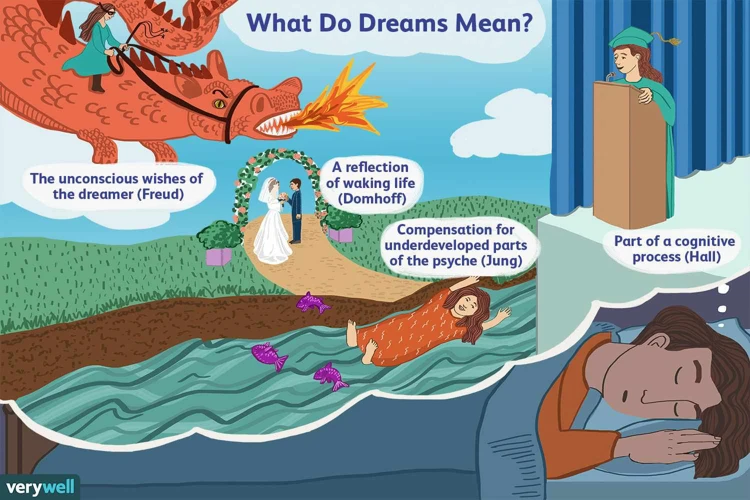Unlocking the Hidden Symbolism: Exploring the Meaning of Violence in Dreams
Have you ever woken up from a dream that left you feeling shaken and disturbed? Dreams have long been a source of fascination and mystery, with their ability to transport us to alternate realities and evoke deep emotions. One particularly perplexing aspect of dreams is the presence of violence. Whether it is experiencing or witnessing acts of aggression, these dreams can leave us questioning their significance. In this comprehensive guide, we will delve into the psychology of dreams, the symbolism they hold, and specifically explore the meaning behind violence in dreams. Join us as we unravel the hidden messages and offer insights into interpreting these unsettling nocturnal adventures.
The Psychology of Dreams

Understanding the psychology of dreams is key to unlocking their hidden meanings. Dreams are a reflection of our subconscious mind and can provide valuable insights into our emotions, desires, and fears. According to Sigmund Freud, dreams serve as a pathway to accessing the unconscious, allowing repressed thoughts and memories to resurface. Dream analysis, a technique used to interpret dreams, helps us uncover the symbolism and significance behind the images and actions experienced during sleep. These symbols may be unique to each individual, as they are influenced by personal experiences, cultural background, and even societal influences. Delving into the psychology of dreams can be an intriguing journey of self-discovery and self-reflection.
The Importance of Dream Analysis
Dream analysis holds great importance when it comes to understanding the messages and meanings hidden within our dreams. By examining the symbols, emotions, and events that occur during our sleep, we can gain valuable insights into our subconscious mind. Dream analysis allows us to delve deeper into our thoughts, fears, and desires, providing a gateway to exploring unresolved issues or uncovering hidden aspects of ourselves. Through the process of interpreting dreams, we can uncover patterns, recurring themes, and symbols that hold personal significance. By connecting the dots between our dreams and waking life experiences, we can gain a better understanding of ourselves and make positive changes. For example, a dream about being stabbed may indicate feelings of vulnerability or betrayal, while dreaming about beating someone up could signify suppressed anger or a need for assertiveness. Dream analysis offers a valuable tool for self-reflection and personal growth.
The Symbolism in Dreams
The symbolism in dreams holds significant meaning and serves as a key to understanding the messages hidden within. Dreams are not to be taken literally, but rather as metaphors and representations of our inner thoughts and emotions. Objects, people, and actions in dreams often carry symbolic representations that may vary from person to person. For example, dreaming of getting stabbed/dream-meaning-getting-stabbed/ may symbolize feelings of vulnerability or betrayal, while dreaming of beating someone up/spiritual-meaning-of-beating-someone-up-in-a-dream/ can signify unresolved anger or a need for control. The interpretation of symbols in dreams requires a deep dive into personal experiences and subconscious associations. Dreams can be seen as a language of the subconscious, communicating messages and insights that can help guide us in our waking lives.
Exploring Violence in Dreams

When it comes to exploring violence in dreams, it is important to recognize that these dreams may not be literal representations of aggression or harm. Instead, they often carry symbolic messages that reflect our inner conflicts, fears, or unresolved emotions. Violence in dreams can manifest in various forms, such as being chased, witnessing fights, or even inflicting harm on others. Understanding the nature of violence dreams can help us navigate their meaning and decipher the messages they convey. While each person’s experience is unique, common types of violent dreams include dreams of being attacked, dreams of being in a war-like scenario, and dreams of witnessing violent acts. Exploring the symbolism behind these dreams can provide valuable insights into our subconscious mind and emotional well-being.
The Nature of Violence Dreams
The nature of violence dreams can be both perplexing and unsettling. These dreams often involve vivid and intense imagery, where individuals may find themselves engaged in acts of aggression or witnessing violent events. It’s important to note that the presence of violence in dreams does not necessarily indicate aggressive tendencies in waking life. Instead, these dreams may be symbolic representations of inner conflicts, suppressed emotions, or unresolved issues. While violence dreams can be distressing, they can also be an opportunity for self-reflection and exploration of the subconscious mind. Understanding the symbolism and underlying meanings behind these dreams can provide valuable insights into our inner psyche. For example, dreaming of someone being shot in the head may represent a need for change or the desire to overcome a significant obstacle. Exploring the nature of violence dreams allows us to delve deeper into our own fears, anxieties, and emotions.
The Common Types of Violent Dreams
While violence in dreams can manifest in various ways, there are some common types that many people experience. One frequent type of violent dream involves being chased or attacked by an unknown assailant, leaving the dreamer feeling helpless and terrified. Another common theme is witnessing acts of violence, such as seeing someone being shot, stabbed, or beaten. These dreams can often evoke strong emotions, including fear, anxiety, and even trauma. Additionally, dreams where the dreamer themselves becomes the perpetrator of violence, engaging in physical altercations or intentionally harming others, can be unsettling. It is important to note that the interpretation of these dreams depends on individual circumstances and the symbolism attached to the specific actions and events experienced during sleep.
Interpreting Violence in Dreams

Interpreting violence in dreams requires a deep understanding of the symbolism and psychological implications behind these disturbing images. Violence in dreams can take various forms, such as being the victim of an attack, witnessing acts of aggression, or even perpetrating violent acts. One approach to interpreting violent dreams is to analyze the symbolism present. For example, being chased or pursued may symbolize a sense of being overwhelmed or pursued by unresolved emotions or problems in waking life. Psychological interpretations suggest that violent dreams can be an expression of repressed anger, fear, or the need to assert oneself. Cultural and societal influences can also shape the meaning of violence in dreams, as different societies may have varying attitudes towards aggression and power dynamics. By exploring the symbolism and considering psychological and cultural factors, we can gain a deeper understanding of the messages our dreams may be trying to convey.
Understanding the Symbolism
To truly interpret the meaning of violence in dreams, it is essential to understand the symbolism embedded within them. Dreams often use symbols to convey hidden messages and emotions. For example, being chased in a dream can represent a feeling of being pursued or threatened in waking life. Similarly, acts of violence in dreams may symbolize inner conflicts, unresolved anger, or feelings of powerlessness. It is important to analyze the specific elements of the dream, such as the location, characters involved, and the feelings evoked, to gain a deeper understanding of the symbolism at play. By unraveling these symbols, we can reveal the underlying messages and emotions that our subconscious mind is trying to convey.
Psychological Interpretations of Violent Dreams
Psychological interpretations of violent dreams offer valuable insights into the underlying emotions and conflicts that may be present in our lives. These dreams can be seen as a manifestation of repressed aggression, fear, or unresolved trauma. One interpretation suggests that violent dreams serve as a release valve for pent-up emotions, allowing us to express and process our aggression in a safe environment. Another perspective is that these dreams may symbolize feelings of powerlessness or the need to assert control in our waking lives. Additionally, violent dreams can be connected to deeper psychological issues such as anxiety disorders or unresolved conflicts. Understanding the psychological interpretations of violent dreams can lead to greater self-awareness and provide a roadmap for inner healing and growth.
Cultural and Societal Influences
Cultural and societal influences play a significant role in shaping the symbolism of violence in dreams. Different cultures have varied interpretations of violence and its implications. For example, in some cultures, dreaming of violence may be seen as a sign of impending danger, while in others, it may be viewed as a symbolic representation of power or transformation. Societal factors such as exposure to violence in the media or personal experiences with violence can also impact the way violence is perceived in dreams. It is essential to consider these cultural and societal influences when interpreting the meaning behind violent dreams, as they provide contextual understanding and help decipher the underlying messages being conveyed.
Overcoming Fear and Anxiety

When it comes to violent dreams, fear and anxiety are common emotions that can linger even after waking up. However, there are techniques for coping with these unsettling dreams and addressing underlying issues. One effective method is keeping a dream journal, where you can record and reflect on your dreams regularly. This helps in identifying patterns and triggers, allowing you to gain insight into your subconscious mind. Another helpful approach is practicing relaxation techniques such as deep breathing, meditation, or engaging in calming activities before bed. These methods can help alleviate anxiety and promote restful sleep. Additionally, seeking support from loved ones or a therapist can provide a safe space to express your feelings and explore any underlying emotional or psychological factors. Remember, addressing fear and anxiety associated with violent dreams is essential for overall well-being and improved dream experiences.
Techniques for Coping with Violent Dreams
There are various techniques that can be helpful in coping with violent dreams and reducing the associated fear and anxiety. One effective technique is keeping a dream journal, where you can document your dreams upon waking up. This practice can help you identify any recurring patterns or themes in your violent dreams, providing insights for further analysis. Engaging in relaxation exercises before bedtime, such as deep breathing or meditation, may also help promote a sense of calm and reduce the likelihood of intense dreams. Creating a peaceful and comfortable sleep environment, free from distractions, can contribute to a more restful sleep and potentially minimize the occurrence of violent dreams. Additionally, seeking support from a therapist or dream specialist can provide guidance and strategies for managing and processing these dreams in a healthy and constructive manner.
Addressing Underlying Issues
Addressing underlying issues is crucial when it comes to coping with violent dreams. These dreams may often be a manifestation of unresolved conflicts, trauma, or deep-seated anxieties. By exploring and addressing these underlying issues, we can work towards reducing the frequency and intensity of violent dreams. One approach is through therapy, such as cognitive-behavioral therapy (CBT), which aims to identify and challenge negative thought patterns and behaviors that contribute to anxiety and distress. Another technique is journaling, which allows individuals to process and reflect on their dreams, gaining a deeper understanding of the emotions and experiences associated with them. Practicing relaxation techniques, such as deep breathing and meditation, can also help alleviate stress and promote better sleep, reducing the likelihood of violent dreams. Taking proactive steps towards addressing and resolving underlying issues can empower individuals to regain control over their dreams and achieve a sense of inner peace.
Seeking Professional Help
When it comes to violent dreams, seeking professional help can be a beneficial option. Dream therapy, also known as dream analysis or dreamwork, provides a structured approach to understanding and interpreting dreams with the guidance of a trained therapist. A dream therapist can help navigate the complexities of dream symbolism, explore underlying psychological issues, and offer techniques for coping with and addressing the fears and anxieties depicted in violent dreams. If you find that your violent dreams are causing excessive distress, interfering with your daily life, or recurring frequently, it may be a sign to consult a dream therapist. Dream therapy can provide a safe space to explore and process your dreams, ultimately leading to personal growth and a deeper understanding of yourself.
When to Consult a Dream Therapist
When it comes to seeking the assistance of a dream therapist, there are certain instances where it may be beneficial. If you find yourself consistently experiencing violent dreams that cause distress, fear, or disrupt your daily life, it may be time to consider consulting a dream therapist. Additionally, if you have attempted self-analysis and interpretation of your dreams but are still unable to find resolution or peace, a dream therapist can offer professional guidance and expertise. They can help you explore the deeper meanings and symbols within your dreams, providing insights into your subconscious mind. Dream therapists are trained to navigate the intricate landscapes of dreams and can help you uncover hidden patterns, traumas, or unresolved conflicts. It’s important to remember that seeking the support of a dream therapist is a personal choice and can be a valuable resource for those seeking a deeper understanding of their dreams and their impact on their emotional well-being.
Benefits of Dream Therapy
– Self-Exploration: Dream therapy provides a platform for individuals to explore their subconscious mind and gain insights into their innermost thoughts, feelings, and fears.
– Emotional Healing: Through analyzing dreams, individuals can identify and process unresolved emotions or traumatic experiences, leading to emotional healing and growth.
– Increased Self-Awareness: Dream therapy enhances self-awareness by bringing attention to unconscious patterns, beliefs, and behaviors that may be influencing one’s life.
– Problem Solving: Dreams often offer symbolic solutions or new perspectives to waking life problems. Dream therapy can help individuals tap into these resources for creative problem-solving.
– Personal Growth and Transformation: By integrating the messages and lessons from dreams, individuals can experience personal growth, self-empowerment, and transformative changes in their lives.
– Stress and Anxiety Reduction: Exploring dreams and gaining insights can help reduce stress, anxiety, and improve overall emotional well-being.
– Enhancing Intuition and Inner Wisdom: Dream therapy encourages individuals to trust their instincts, intuition, and inner wisdom by listening to the messages conveyed through dreams.
– Supporting Spiritual Growth: Dreams can have profound spiritual significance. Dream therapy can deepen one’s spiritual connection and facilitate spiritual growth and understanding.
Dream therapy offers a unique and powerful approach to self-discovery, healing, and personal development. Whether utilized as a standalone therapeutic technique or combined with other approaches, the benefits of dream therapy are vast and can have a positive impact on one’s life.
Conclusion
In conclusion, the exploration of violence in dreams offers us a deeper understanding of ourselves and the complexities of the human psyche. Dreams, with their symbolic language, provide a powerful means of communication from our subconscious. By interpreting the meaning behind violent dreams, we can gain insight into our fears, anxieties, and unresolved conflicts. It is essential to remember that these dreams do not necessarily predict or condone real-life violence but rather serve as a reflection of our inner struggles. Utilizing techniques for coping with violent dreams and addressing underlying issues can alleviate fear and anxiety associated with these dream experiences. Ultimately, seeking professional help, such as dream therapy, can provide valuable guidance on how to navigate the intricate realm of dreams and foster personal growth. Embrace the opportunity to explore the fascinating symbolism within your dreams and unlock the hidden messages they hold.
Frequently Asked Questions
1. Can dreams predict the future?
While dreams can sometimes contain elements that seem prophetic, there is no scientific evidence to suggest that dreams have the ability to predict the future. Dreams are more closely linked to our subconscious thoughts and emotions, serving as a reflection of our innermost desires, fears, and experiences.
2. Why do some people have more vivid dreams than others?
Vivid dreaming can vary from person to person, and several factors can contribute to the intensity of dreams. These factors may include stress levels, sleep quality, medications, and even individual brain chemistry. Certain individuals may naturally have a greater propensity for vivid dreaming as well.
3. Are nightmares a sign of underlying psychological issues?
While nightmares can be distressing, they are not always an indication of underlying psychological issues. Nightmares can be caused by a variety of factors, such as stress, anxiety, trauma, or even certain medications. However, if nightmares consistently disrupt sleep and cause distress, it may be beneficial to seek professional help.
4. Why do we often forget our dreams?
Forgetting dreams is a common occurrence. Shortly after waking up, the brain shifts its focus to conscious thinking, causing the details of dreams to fade from memory. The rapid eye movement (REM) stage of sleep, where most dreaming occurs, is closely associated with forgetfulness of dreams.
5. Can dreams help us solve problems?
Research suggests that dreams can aid in problem-solving by providing a different perspective or offering creative insights. Dreams tap into the subconscious mind, allowing for connections and associations that may not be accessible during waking hours. However, it is important to note that not all dreams have a direct problem-solving function.
6. How do cultural influences affect dream symbolism?
Culture plays a significant role in shaping the symbolism in dreams. Cultural beliefs, customs, experiences, and traditions can influence the meaning assigned to specific symbols and actions in dreams. It is important to consider cultural context when analyzing the symbolism within a dream.
7. Can recurring violent dreams indicate a deeper psychological issue?
Recurring violent dreams can be a signal of underlying psychological issues, such as unresolved trauma, anxiety, or unresolved conflicts. If these dreams persist and cause distress, it may be beneficial to consult with a professional to explore potential underlying psychological factors.
8. Are there any techniques to promote positive dreams?
While you cannot control the content of your dreams, there are techniques that may increase the likelihood of positive dreams. Practicing relaxation techniques before bed, maintaining a consistent sleep schedule, and engaging in positive imagery or affirmations throughout the day can create a more conducive environment for positive dream experiences.
9. What is lucid dreaming?
Lucid dreaming is a state in which the dreamer becomes aware that they are dreaming while still remaining within the dream. Lucid dreamers have the ability to consciously control certain aspects of their dreams, such as the storyline or their actions. Lucid dreaming can be achieved through various techniques and practices.
10. Can analyzing dreams be helpful in personal growth and self-reflection?
Absolutely. Analyzing dreams can provide valuable insights into one’s emotions, fears, desires, and inner conflicts. By examining the symbolism and themes within dreams, individuals can gain a deeper understanding of themselves, promote self-reflection, and potentially address unresolved issues that may be influencing their waking life.







